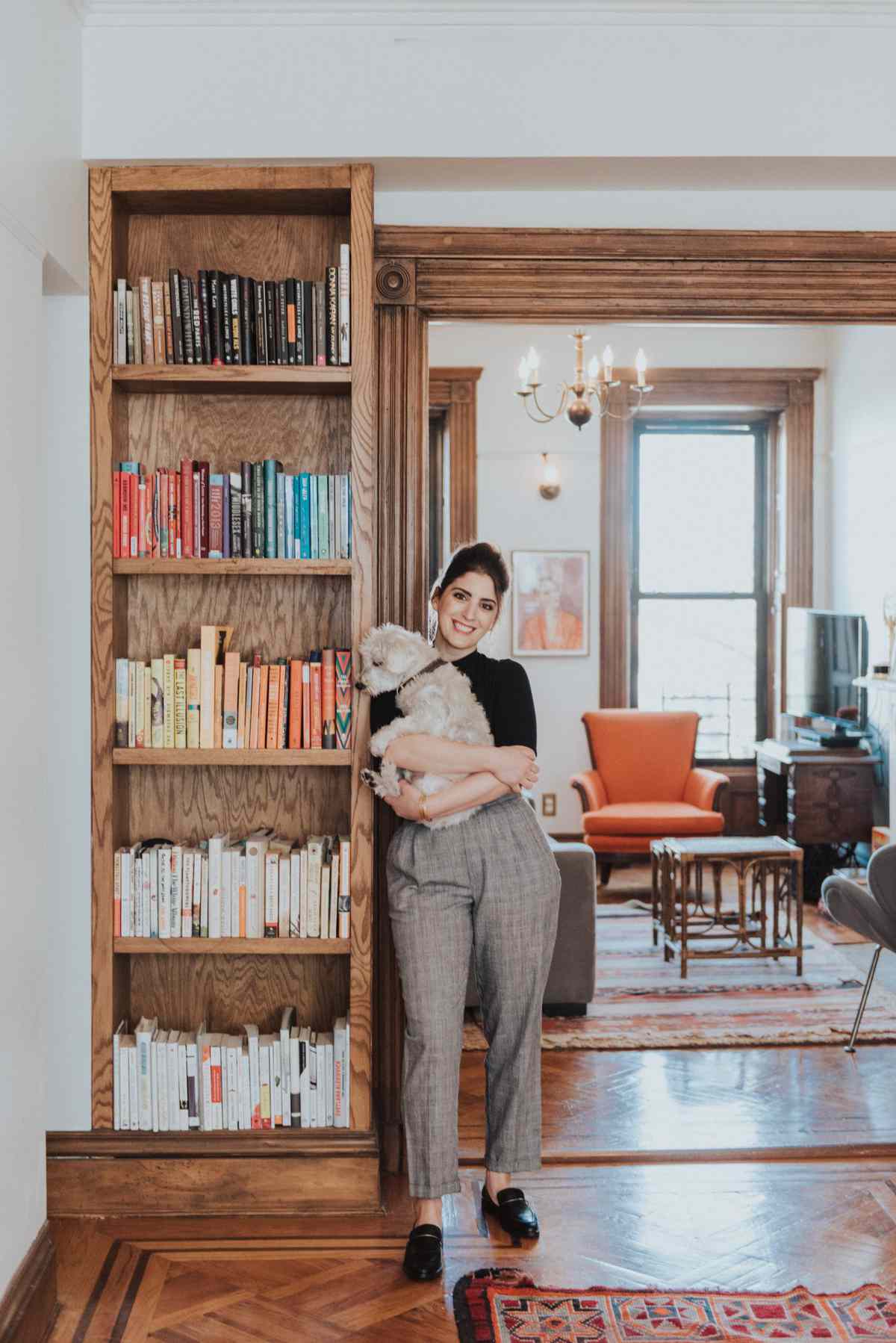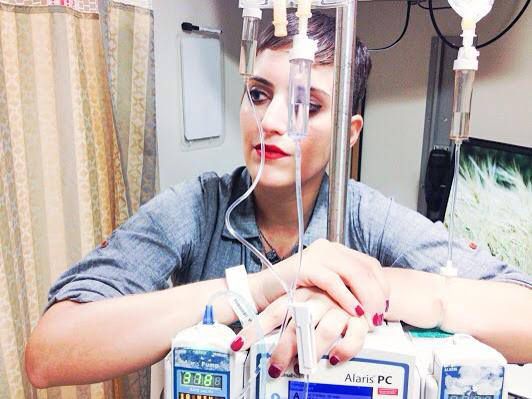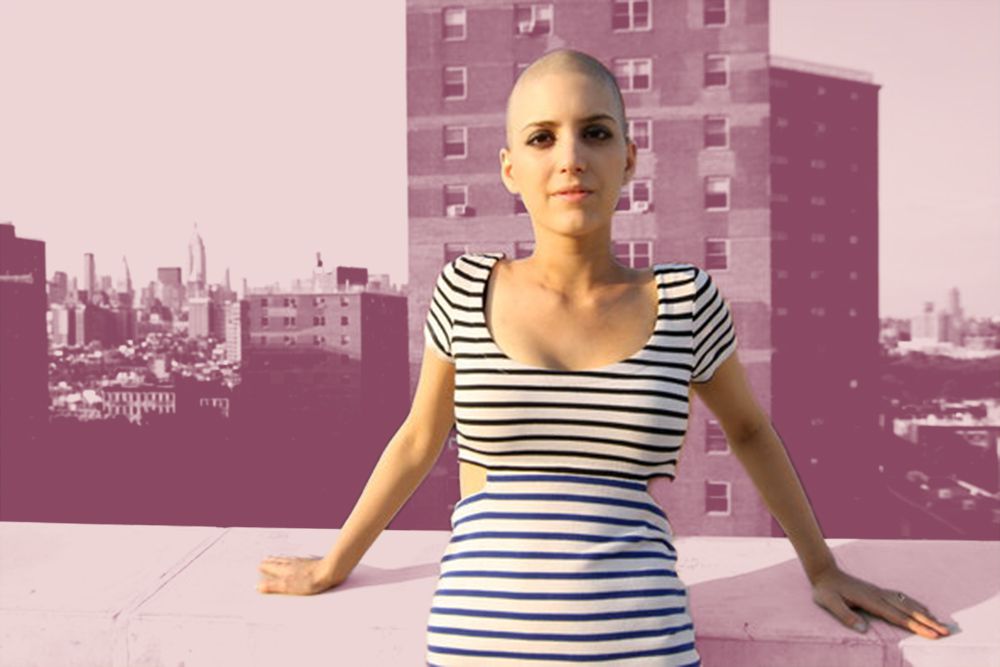Suleika Jaouad was a 21-year-old college senior at Princeton University when she felt the first symptom: a "maddening, claw-at-your-skin, keep-you-up-at-night itch." The itch started on the tops of her feet, eventually moving up her calves and thighs.
It was myelodysplastic syndrome, also known as pre-leukemia, a rare bone marrow disorder. But no one knew that at the time; none of the doctors she went to could figure out what was causing the itchiness. So Jaouad tried to not make a big deal out of it, hoping whatever it was would clear up on its own. It didn't.
She would soon find out that the itch was the beginning of a years-long journey of diagnoses, treatments, recovery, and self-discovery. And it was a journey that Jaouad, author and former New York Times columnist, wrote about in her recently released memoir, Between Two Kingdoms: A Memoir of a Life Interrupted ($18.24, amazon.com).
RELATED: This 26-Year-Old's Itchy Skin Turned Out to Be a Symptom of Hodgkin's Lymphoma
After almost four years of grueling treatments that took a huge toll on her mental and physical health, Jaouad, 32, is considered cured of her cancer. Now that she's no longer fighting for her life, she shares with Health the details of her experience and seven things she learned from her cancer journey.
 Suleika Jaouad . Doctors told her to stop working so hard. "I think there was this way in which, especially as a young woman, I didn't feel taken seriously…The message I received from that was there's nothing really wrong with you; and if there is something wrong with you, it's about your lifestyle or in your head."
Suleika Jaouad . Doctors told her to stop working so hard. "I think there was this way in which, especially as a young woman, I didn't feel taken seriously…The message I received from that was there's nothing really wrong with you; and if there is something wrong with you, it's about your lifestyle or in your head."
As the months went on and her symptoms worsened, Jaouad started to doubt herself, thinking she wasn't cut out for the adult world. "I remember working as a paralegal at a law firm, being so exhausted that, midday, I would go to the utility closet to take a nap," Jaouad says. "And to me, that wasn't the evidence of a serious illness; it was evidence that somehow I wasn't able to work long hours or to work as hard as the people around me."
Throughout this time, Jaouad kept second-guessing herself by thinking, They have the medical degrees. Not me. Self-censorship and self-doubt became her constant companions. "I think for a lot of women, when we find ourselves in the doctor's office, there's a kind of power dynamic there where sometimes it's difficult to push back, to ask questions, to be persistent," she explains.
That changed months later, once she got her leukemia diagnosis. "I learned that no matter how smart or caring or compassionate my doctors were, I needed to be informed, and I was going to need to learn to be my own advocate and ask those difficult questions and to push back when needed."
The importance of being her own advocate really came into focus when she was Googling her treatment and found out it could cause infertility. Not one of the medical professionals she'd been seeing had mentioned this risk to her. "That felt like such a breach of trust early on in that patient-doctor relationship. And it made me wonder what else I wasn't being told," Jaouad says. "The next day, when I brought it up with them… that was my first moment of really inserting myself in those conversations. And I remember saying any decisions or conversations implicating my body or my future are ones that I need to be a part of."
RELATED: Before She Was Diagnosed With Multiple Sclerosis, This Dancer and DJ Saw 14 Specialists
A supportive community makes a huge difference
After her diagnosis, Jaouad approached her disease like a reporter (her dream job at the time), seeking out sources, doing her own research, and finding other people who had received a similar diagnosis to listen and learn from them. But one source of information empowered her in another way: her support group for young adults with cancer.
There, she befriended other women at the hospital who were undergoing treatment. "We became each other's sources of a different kind of knowledge," she says. "Not just about the medical side effects or navigating the hospital system, but how to navigate the emotional symptoms of illness, the financial ones, the career ones, and just kind of crowdsourcing that information and that insight from people who weren't looking at it from the outside, but who were living it."
When the pandemic hit, she used what she learned about the importance of community to help her through lockdown and social distancing. During COVID, Jaouad formed her own community with Isolation Journals, a free e-newsletter that provides journal prompts, which thousands of people from around the world respond to and reflect on with each other. "We're in real time making meaning and processing this changing world. So that's always been that great source of strength for me—that experience of making sense of these circumstances on our own terms in our own ways," she says.
RELATED: What is Chronic Lymphocytic Leukemia? Cancer Doctors Explain the Symptoms and Treatment Options
Make time for what’s important to you, even when you’re sick or in treatment
When she was at her sickest, Jaouad only had about three hours' worth of energy a day to spend on her interests and passions. So she had to make sure she was focusing those hours the way she wanted. During that time, she had the clearest sense of purpose that she ever had.
This approach to making the most out of her available time is something she continues to do. "Often when I wake up in the morning and I'm thinking about my day, I try to imagine if I only had three hours today to do anything, what would feel most important to me," Jaouad explains. "Not in terms of my to-do list, but what do I want to feel today, who do I want to take time to be with or even just send a text message to? And so I very much try to harness that sense clarity, that experience of stripping things down to the most meaningful molecule."
 Suleika Jaouad , bald head, and lack of eyelashes and eyebrows drew stares, and people would go quiet; the experience was jarring. So her advice is to treat people who may be sick as a person first and a patient second.
Suleika Jaouad , bald head, and lack of eyelashes and eyebrows drew stares, and people would go quiet; the experience was jarring. So her advice is to treat people who may be sick as a person first and a patient second.
When her friends would visit her in the hospital, she told them that she wanted to hear all their silly, petty gossip. "I don't want you to feel like you can't share things that are trite or share stories about your weekend with me just because I'm here. I want to feel normal," she'd tell them. And being treated like a regular person rather than a cancer sufferer helped her better deal with her illness
RELATED: How to Stop Feeling Guilty About Everything
Voicing raw, honest emotions helps everyone
At the same time, when someone does want to talk about their fears, go there with them. Not every conversation has to be about silver linings.
"I think one of the difficult things for me was that I was putting on a brave face for my loved ones; they were putting on a brave face for me. But what got lost in that was the ability to talk about our fear," Jaouad says. "We were all kind of protecting each other from our fears, but in doing so, we were kind of isolating ourselves."
In her book, she wrote that she felt like a burden to her family, as though she was taking up too much space. Jaouad goes back to the importance of community; finding a forum—family, friends, a support group, or fellow patients—where you can share that guilt out loud is key. "To me, the greatest antidote to guilt is sunlight…I think when we kind of carry our guilt or shame privately, it has a way of festering and spreading and contaminating everything."
Whether you're the sick person or the loved one of someone struggling with illness, turn the focus away from the usual platitudes and messages of positivity and be candid about vulnerable feelings you might think you need to hide. While it may be more uncomfortable to have the tougher talks, Jaouad says they can help validate any fears or guilt that both parties might be carrying.
Mental health needs caretaking, too
If Jaouad could tell her newly diagnosed 22-year-old self anything about what she was about to experience, it would be that taking care of her emotional health is just as important as focusing on the physical aspects of the disease, if not more important.
"I went into my diagnosis believing that I could remain the same that I had been, believing that I was going to be strong, that I was going to push through it, and that I would move on with my life. And of course, that didn't happen," Jaouad explains. "So I wish I had put in place certain support systems before I desperately needed them—that I had found a therapist who was well-versed in serious illness, that I had looked into support groups."
RELATED: This Woman's Searing Toothache Was Misdiagnosed by Doctors, and It Turned Out to Be Cancer
‘Moving on’ is a myth—but you can move forward
For three-and-a-half years, Jaouad underwent treatment for leukemia. This included round after round of chemotherapy, a clinical trial, and a bone marrow transplant. But the hardships didn't end once treatment did. "So much of the focus is on finding a cure or getting to a point where you're cured, and there's not a lot of thought about what happens afterward," she says.
Once her treatment was done, Jaouad felt as though she should eagerly and gratefully get back into the groove of life. But she was far from able to do that. "We talk about PTSD; we talk about reentry in the context of veterans returning from war or prisoners being released after a long period of incarceration, but the same is true of people surviving a traumatic illness or a traumatic experience," Jaouad says. "I think this notion of moving on is a myth. We don't get to move on from those most difficult passages. We have to kind of learn to move forward with them. We have to integrate and learn to coexist with whatever pain or heartbreak or sorrow [came from them]."
Following treatment, every time she coughed, saw a new bruise, or got a call from her doctor's office, Jaouad was filled with anxiety. She had to learn how to live between the two kingdoms of well and not well, as her book title conveys.
"You think of health as binary: You're either sick or well, whole or broken. I think that kind of binary thinking is flawed," Jaouad says. "Most of us live somewhere in the middle. And so not striving for some perfect state of wellness is liberating. And learning to make a home in the wilderness of that in-between place was what actually allowed me to begin that process of healing and moving forward."
"Between Two Kingdoms" delves into that in-between space. Jaouad—who will be celebrating her 9-year bone marrow transplant anniversary next month—writes about her experiences after treatment, which included a cross-country solo road trip when she was 27. With the memoir, she wanted to reveal what happens after a person survive what was thought to be unsurvivable.
"I wanted to write about the imprint of illness, not just on the body, but our relationships, on our sense of self, on our sense of sexuality," she explains. "So often, the final act of [illness] stories ends with joy or it ends with death, but we don't give much ink to after that. You know, what happens when our lives are upended and we have to learn to live again?"
To get our top stories delivered to your inbox, sign up for the Healthy Living newsletter.
Each product we feature has been independently selected and reviewed by our editorial team. If you make a purchase using the links included, we may earn commission.
